Breastfeeding vs. Formula Feeding: As a Type A Woman What Did You Choose?
This post may contain affiliate links and CorporetteMoms may earn commissions for purchases made through links in this post. As an Amazon Associate, I earn from qualifying purchases.
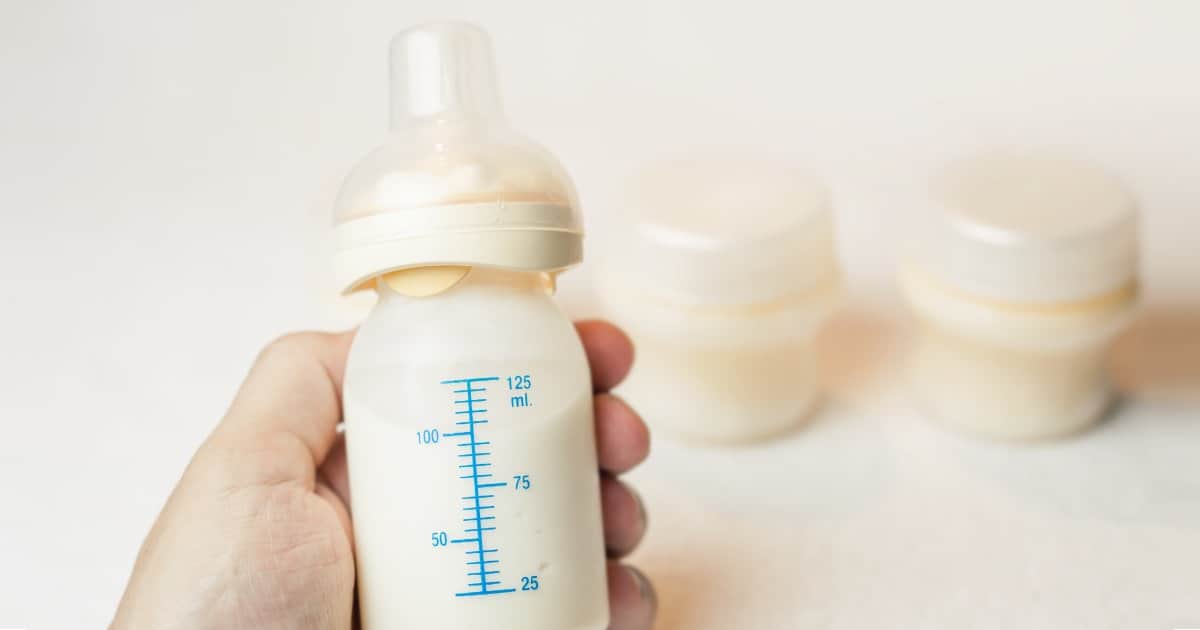
Here’s what may be a weird question: as a Type A, goal-oriented, overachieving chick, what was your thought process regarding your decision on breastfeeding vs. formula feeding your child? What was your emotional and intellectual response to the idea of it, and how did you reason through whichever decision you made?
{related: you may want to check out this guestpost with tons of combination feeding tips, as well!}
Among friends I’ve seen a wide variety of responses to it, all of which may have been made… stronger, shall we say, based on the Type A-ness of the mom. But I think it’s an interesting question. (I really hope we can talk about this without judgment — for my $.02, there is no “right” answer for whether/how long to breastfeed or formula feed your child.) I’ve seen some moms grit their teeth and approach it with a grim determination.
I’ve seen some who really loved the closeness with the baby — and some who were turned off by the feeling of being the Milk Lady.
I’ve seen some high-achieving women say, “I’ll give it a go during maternity leave, but my career is too busy to be bothered with pumping and timing all of that.” I saw one interesting Facebook post from a very high achieving mom who noted that she felt she had to stop nursing each of her kids at 15 weeks in order to reclaim some ownership of herself and her body and otherwise get through her postpartum identity crisis.
I noticed commenters were talking about “nursing goals” last Tuesday, which is new to me but makes sense to me as a goal-oriented woman.
So: how did YOU approach breastfeeding or formula-feeding? Why did you make the decision you made? Especially for those among you who have pumped for an extended period — how do you think about it?
For my own $.02 — even though I’d read a lot about how great breastfeeding was for the baby — the primary reason I really, really wanted to breastfeed my first kiddo, J, was because I’d heard it helps with weight loss. I went into the pregnancy with extra stress weight, and then gained 35 pounds with the pregnancy. Yay?
When I had J in 2011, there had been a lot recently in the news about a state-sponsored campaign focusing on how breastfeeding helps with weight loss — and a lot of noise from random bloggers (I can’t find a single link right now, I’m sorry!) about how “disgusting” the campaigns were when there are so many other good reasons to breastfeed. These dissenters seemed to all be saying: get over yourself, Selfish Mom!
But: when I was in the weeds with J, and breastfeeding was SUCH a struggle, I was thankful to have a selfish reason to struggle forward with it. Our breastfeeding journey was a bumpy one — my milk took forever to come in, my son dropped a ton of weight too quickly, and there was a time period of about a week where my lactation consultant had me pump every two hours — around the clock. Good times!
Of course, the “helps with weight loss” advice isn’t necessarily true for everyone, and I found I couldn’t take off any of the weight while nursing J. But I persevered with breastfeeding because another selfish reason won out: laziness. I didn’t want to wash a zillion bottles, and I liked that “milk” was one less thing I had to remember to take with me when I left the house with him.
What was your thought process on breastfeeding vs formula feeding, ladies? A penny for your thoughts on the issue…
Psst: If you’re on the nursing/pumping side of things… these are some of our favorites!
As of 2024, readers love nursing bras from Bravado, Cake, Natori, Elomi, and Kindred Braverly!
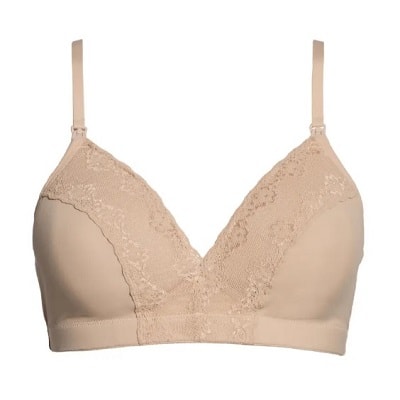
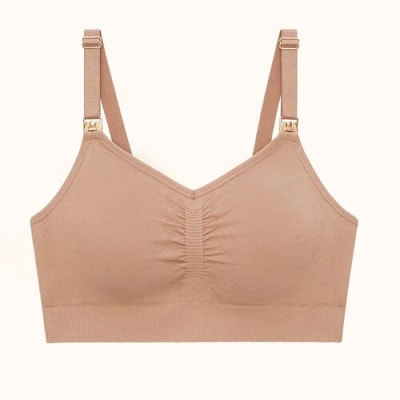
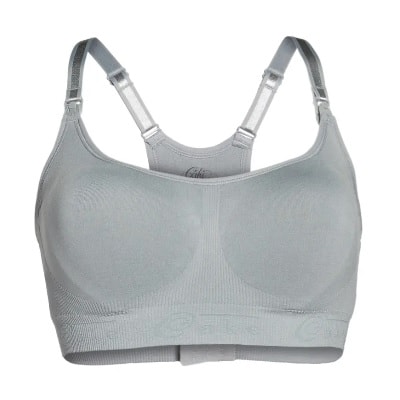
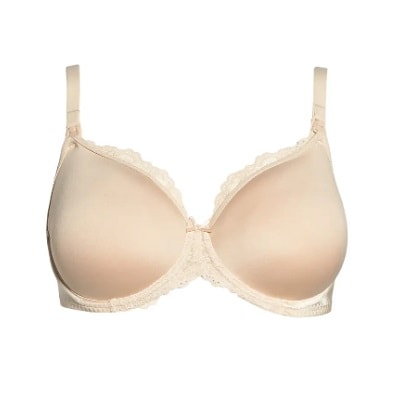
Stay tuned for some of our favorite items for pumping!
Picture credit: Deposit Photos / Petunyia. (Originally pictured (2015): Production is 25% of what it…, originally uploaded to Flickr by Diana Schnuth.)
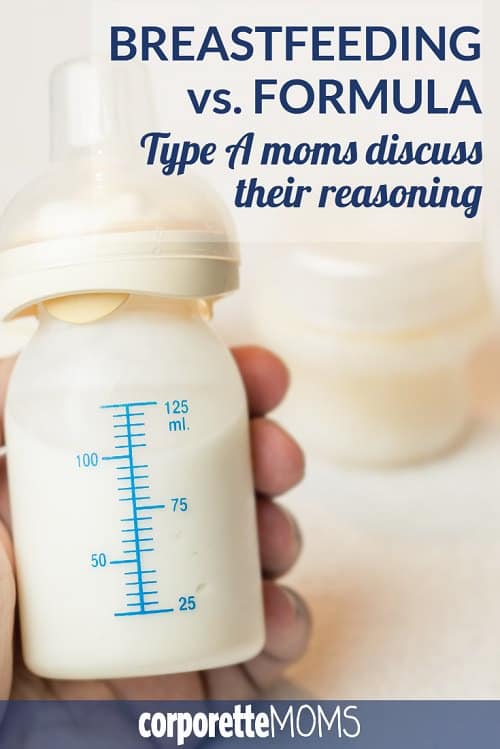


I breastfed my first two children until they were three. Now my son is between one and two and we are still at it. Never used any formula for any of them. I’m fulltime in big law so sure the pumping is a bit inconvenient (pumping in airport bathrooms in LAX! Eww!), but we have a really awesome pumping room at work so how could I say no to that? I love lots of things about breastfeeding, including how much the babies just love it which is so sweet and pure, but I think the main thing for me is how it makes me and the baby have a special bond that no one else can have. If I’ve had a hectic day at work, and I come home and the baby starts jumping up and down because he wants to nurse (as he does), I know all is well with us.
My philosophy is that I’ll breastfeed as long as both of us still want to. I went in with the idea of breastfeeding for at least a year, but my son is 14 months old now, and neither one of us is close to calling it quits. My son has been a very frequent nurser since the beginning and is still nursing frequently now. I thought I would stop pumping at a year, but since my son still nurses so much (and demands the same amount of milk at day care, even though he is eating plenty of solids now) and is on the small side, I’m just going to keep going. Pumping isn’t my favorite activity, but, honestly, I really don’t mind it as much as others seem to, and I feel good about continuing to give him breastmilk (and having control over what goes into my body) instead of cow’s milk, which I can’t control. I guess that’s the Type-A part of me coming through an otherwise go-with-the-flow attitude toward breastfeeding. I don’t think breastfeeding is providing any weight-loss benefits to me, but I do enjoy the closeness and connection with my baby and just don’t feel the desire for independence that others do (and that I thought I might feel at this point).
Reading this as I pump right now. I had never thought about whether my Type-A personality may be a factor on my fixation with breastfeeding until my baby’s first birthday. Perhaps that has something to do with it. I don’t love breastfeeding, but I don’t dislike it either. Oddly, I feel fairly neutral. I do dislike pumping, but not enough to stop. I am thankful that I have experienced a breastfeeding relationship with my baby, and at times have found it pretty amazing how in sync our bodies can be. I am thankful to have a supportive husband, who contributes by washing and packing my pumping supplies daily, as well as preparing and cleaning the baby’s bottles for daycare. (When she was younger and I was on maternity leave, he would give her a bottle daily. This was how he participated in her feeding then, and allowed me to pump and build up a freezer stash.) I also am extremely thankful to have a manager and colleagues who support my decision to breastfeed (beyond what is legally required). I am provided the space and time to pump, and they respected my request to not travel until the baby is one (when I plan to wean). Perhaps this is due to the fact that a solid 50% of my coworkers are women, as is my manager.
This has been a fascinating thread to follow. I’m very thankful to see a civilized discussion about nursing, and I’m very happy to see nursing discussed from the perspective of career-minded individuals. I have a 7 mo old who has only had formula a handful of times (once during a long road trip, and when he first started at daycare since I did not have a freezer stash accumulated). I am very fortunate to work from home, so I can pump from the privacy of my own home office. However, it is still a very time consuming endeavor, and I’m looking for the light at the end of the tunnel – or, more accurately, determining where the end of the tunnel is. I doubt I would still be pumping if I worked in a typical office, though – even with telework, I have quite a few meetings, and it can be hard to plan to pump around that schedule. (I know some people pump during teleconferences, but it’s just too awkward for me.)
I was very pro-breastfeeding [and type A overachiever] long before I had kids. My mom breastfed all of us when it was popular to formula feed on schedule. Sadly, she died when I was young so I had no help when I had my sons. My MIL didn’t understand why I bothered, and so we just didn’t talk about it.
I had read the studies, and between the health benefits for baby & mom, the weight loss [and yes, it did help me especially with baby #2], lower risk of certain cancers, lower risk of cardiovascular disease which runs in my husband’s family… and the environmental benefits, cost, and general laziness. It was an easy decision. I worked mostly afternoon/evenings as a university instructor at the time, and I’d pump during classroom breaks, often in the ladies’ room. I found it easiest to use a manual pump on the road – less fuss & mess.
That said, I had problems with latch with my oldest and had to supplement for a few days. I had had an emergency c-section after pushing for 4.5 hours [not just labor – PUSHING] because he got “stuck.” We later found out he had a short cord. I had preeclampsia, a lot of pain from the c-sec, and my preeclampsia worsened after birth so I spent my first week home on strict bedrest. I finally begged my OBGYN to let me go to the lactation consultant at my pediatrician’s office, and in 10 minutes, she fixed the latch issue, and we never had another problem except a minor case of thrush. With my second, I also had preeclampsia, and was blessed to have a “surprise” VBAC. He also had a short cord, but because they let him slowly descend [“passive descent”] he was born happy and healthy. No latch or other issues with him except a little jaundice.
My first self-weaned when I was 5 mo pregnant with my second, so it was right before his second birthday. My youngest self-weaned at 2 1/2. But after one year, we “renegotiated” nursing and dropped a few because they were on solid food. Toward the end, it was just nursing at bedtime and nap time, and during morning “lovies.” I remember looking down at my son nursing and I couldn’t tell where he ended and I began. I have no doubt that it made me feel more connected to my sons, especially since I had postpartum depression with #2. I felt amazing that my body could do this – that I could nurture these babies in the womb for nine months, and then that I could feed them, exclusively, afterward. It gave me an appreciation for my body that I never had before and still struggle with today.
Each mom should do what she feels is best for her and her baby, but I feel strongly that every woman should just try it for a month, because nothing anyone can write or say can explain how it feels.
There is some really fascinating research on breast milk in this article – worth a read if you have some time. (The article is more generally about germs but touches on this subject, and the value of breast milk, in a totally different context.) I’ve copied an except below.
http://www.nytimes.com/2013/05/19/magazine/say-hello-to-the-100-trillion-bacteria-that-make-up-your-microbiome.html?pagewanted=1&_r=0&ref=general&src=me
The study of babies and their specialized diet has yielded key insights into how the colonization of the gut unfolds and why it matters so much to our health. One of the earliest clues to the complexity of the microbiome came from an unexpected corner: the effort to solve a mystery about milk. For years, nutrition scientists were confounded by the presence in human breast milk of certain complex carbohydrates, called oligosaccharides, which the human infant lacks the enzymes necessary to digest. Evolutionary theory argues that every component of mother’s milk should have some value to the developing baby or natural selection would have long ago discarded it as a waste of the mother’s precious resources.
It turns out the oligosaccharides are there to nourish not the baby but one particular gut bacterium called Bifidobacterium infantis, which is uniquely well-suited to break down and make use of the specific oligosaccharides present in mother’s milk. When all goes well, the bifidobacteria proliferate and dominate, helping to keep the infant healthy by crowding out less savory microbial characters before they can become established and, perhaps most important, by nurturing the integrity of the epithelium — the lining of the intestines, which plays a critical role in protecting us from infection and inflammation.
“Mother’s milk, being the only mammalian food shaped by natural selection, is the Rosetta stone for all food,” says Bruce German, a food scientist at the University of California, Davis, who researches milk. “And what it’s telling us is that when natural selection creates a food, it is concerned not just with feeding the child but the child’s gut bugs too.”
Where do these all-important bifidobacteria come from and what does it mean if, like me, you were never breast-fed? Mother’s milk is not, as once was thought, sterile: it is both a “prebiotic” — a food for microbes — and a “probiotic,” a population of beneficial microbes introduced into the body. Some of them may find their way from the mother’s colon to her milk ducts and from there into the baby’s gut with its first feeding. Because designers of infant formula did not, at least until recently, take account of these findings, including neither prebiotic oligosaccharides or probiotic bacteria in their formula, the guts of bottle-fed babies are not optimally colonized.
I approached it like a competition/project where I set up mini goals, created a Google doc sheet, and quietly celebrated my milestones. This was all personal, however, I have no opinion on whether or not someone breast feeds or formula feeds and I would say with the exception of my husband, my mom, and maybe one friend, no one knows I exclusively breast fed. It started with a class where the LC (not a crazy lady, by the way, she only said this to illustrate possibility, I think) said she had 2 kids and none of them ever received a drop of formula. That’s when it became my goal. I struggled hard core with my first — his latch sucked and so I was exclusively pumping until about 10 weeks when he was finally big enough and seemed to get it down. I went back to work at 3 months and pumped 3 times a day for a year. That was my goal. For my second, it was so much easier. She latched right away and it was effortless for her (and me). I built up a stash and continued to pump at work just like I did for my first. I will say that breastfeeding had some serious up sides for me– I was at my lowest adult weight ever around 9-12 months and unless I’m nursing I can’t achieve that same weight through diet and exercise. And, the oxytocin let down does something serious to my brain — a calming euphoria that was very welcome when I was pumping at a job I hated.
For me, breastfeeding was super hard. I also run marathons and can compare it to that — it can take some serious grit and doing something when you don’t always feel up to it. Kind of like parenting in general. I will say that under supply was never an issue for me and I know it’s a serious problem for several women so in some cases it just can’t be done.
Such a fascinating thread. I see myself in many of the comments. I just wanted to add for me that I was shocked how tough nursing was, and how truly aggressive with myself I became over it. The type-A-ness kicked right in, and, in a strange way really allowed me to focus on that nursing goal to the exclusion of all else. And boy was there “else”. It was grueling – no sleep and so, so much pressure, both before and after return to work that I wouldn’t have enough for baby. I spent more than 90+ minutes pumping at work each day, so virtually everything else that was non-essential to that task was out. I don’t think I went out to lunch more than once or twice in a year, whereas I used to do it multiple times a week. I also avoided all conferences, non-essential meetings, and certainly overnight trips like the plague. When anything seemed to be looming, it caused me substantial anxiety, until I would work it through and figure out how to avoid or deal.
Nursing changed my life in so many unexpected ways. There was a board I had always been very active with, but the meetings were just incompatible with nursing, so I had to give those up for almost a year. The division of labor was also a huge problem. My husband also works and I never quite had the heart to figure out one of those nighttime arrangements where he does all the helping (change diaper, etc.) and just brings the baby to me to nurse, so I could maximize sleep. We tried it once or twice, but he was just so loud through the whole process, it just seemed useless and I took over. That is why today, at 16 months, I am still the only one getting up at night. BIG downside.
On the other hand, I love the closeness so much and am actually really nervous to end nursing. We are at 16 months now and I still nurse morning (unless he is really sleeping late) and night. My son is super active and I know that without nursing there is no earthly way he would slow down and just cuddle in my arms each morning and night. I feel that the whole process gives him so much support and stability. And, let’s be honest, there is a part of me that loves being irreplaceable. That said, I could do without the inevitable stress I am still dealing with of what to do when I need to be gone one evening. It’s all a trade-off, and overall, I am happy and proud of how things turned out.
I decided to breastfeed initially because it’s “best for baby”. Luckily, it came pretty easily, though I did struggle with the typical pain issues early on and supply issues later. In hindsight, I wish I wouldn’t have put so much pressure on myself to give my baby 100% breastmilk until age 1, and will definitely be so much more laid back the 2nd time around (in a few days, eek!). The few times that childcare absolutely had to supplement when I didn’t have enough milk for him to make it through the day, was no big deal whatsoever. However, at the time, I literally cried over any spilled drop and I almost had a nervous breakdown when 6 oz of milk got lost in transport to childcare and was spoiled. I wish there was much more of am emphasis on letting moms know that it doesn’t have to be all or nothing, but with Type A personalities, maybe that’s something that can’t be helped!
First, can I just say that this thread is everything I love about this s1te? — I haven’t seen such a civil conversation on this topic anywhere else on the internets.
Fittingly, I’ve been checking periodically while nursing all day, but held off on responding until I two hands and a computer instead of my phone. Anyway, I planned to exclusively BF my son with no formula for a year until he could switch to cow milk. I did nurse/pump for a year, but we ended up supplementing with formula beginning around 8 months after my supply dwindled following a 10 day work trip. The trip was kind of an epiphany moment for me. It was totally voluntary, but to a country I’d always wanted to visit. I had a decent freezer stash of milk, but knew it wouldn’t last the duration. Once I came to the (immediate) conclusion that it was a no-brainer to go and let baby drink formula, I realized that should have been my approach all along: breastfeeding is fine as long as it doesn’t interfere with anything else “more important.” And my “more important” bar is pretty low — I was just very lucky that was the first time my work, sanity, fun, etc had been run into serious conflict with nursing. That’s not to say I didn’t curse pumping on a regular basis or occasionally hate feeling like a milk cow, but it was doable. I liked the breaks from work and since I was able to get 10+ oz in about 15 minutes, I could pump 2x per day without a huge impact on my work. I also was lucky that (until the trip) my supply didn’t seem to be impacted by my inability to keep a super consistent schedule. I liked nursing, and I didn’t really have any good reason not to do it.
This time around, I still plan to nurse for a year, but I’m way more relaxed about it, and if we end up supplementing with formula, so much the better as long as my daughter is healthy. I was worried about “nipple confusion” with my son, so I refused to pump or let my husband give him a bottle for at least a month… it wouldn’t have been a huge issue, but I was taking a class at night and actually left my 2 week old baby home with my husband one night when we were doing field work (I brought son along to lectures). I think they both cried for at least a half hour when son was hungry and husband couldn’t feed him. This time, I realize that is stupid and we’ve already tried a couple times to get new baby to take a bottle because as much as I like snuggling my daughter, I would really like the option to sleep and let someone else feed her in the middle of the night occasionally. She’s not super cooperative, but I have somewhere to be for a few hours in the evening next week and I’m assuming if she’s hungry enough she’ll get over it Either way, I have milk in the freezer ready for my husband to try.
I was a BFAR mom (breast feeding after a reduction). I was prepared, I thought, for the possibility that breast feeding wouldn’t work at all. Things started rocky, we supplemented from the beginning and really struggled to even get 1-2 successful nursing sessions a day those first few weeks . Latching was painful even though it was technically correct. Pumping was an absolute waste of time. I could only produce at best a couple of ounces in a session. Slowly we got more efficient and I could provide more of his feedings. Somehow we made it combo feeding for 14 weeks. I weaned shortly after going back to work. Mostly, I was just so darn tired of the struggle. If I had to do it again, I would have been proud of every feeding I gave my child. I would have accepted my body’s limitations and been grateful for quality formula options instead of beating myself up that I couldn’t supply every ounce of his nutrition.
With my first, I planned to definitely breastfeed and pump when I was in law school. After maybe 10-12 weeks of (at various times) mastitis, multiple yeast infections, and poor latching I decided, you know what, formula supplementation is OK too! I stopped pumping at 4 months and went to formula exclusively. I felt a little guilty at the time, but it was in all honesty a huge relief, made co-parenting a million times easier, and I got more sleep.
With my second I plan to breastfeed through maternity leave as long as it works. If it works longer than that with pumping at work, great. But when it stops working for me — formula is OK too! No guilt this time.
First time commenter here. Like a lot of the commenters last week, I set mini-goals: “I’ll just try it and see how it goes.” When it went swimmingly – like, zero problems at all -, i set the goal of EBF through maternity leave. I did not have the emotional aspect of it that many women do, but I found it very convenient and economical.
My next goal was 6 months, and I pumped 3x daily. I have a pumping-friendly setup, the resources to get a great pump and multiple parts, and a husband who washed everything, so that went well, too. By around 9 months, I just pooped out and went down to 2x a day. No real reason other than being tired of it. I hoped my kid wouldn’t need the third bottle with the solid food she was eating, but she still did. So I kept pumping 2x a day and supplemented with formula. This was extremely hard on me. I eat extremely “cleanly” and cook “clean” meals for husband and I, and I felt terribly giving my daughter what seemed to me like artificial food – but I just couldn’t bear that third pumping session any more. Daycare had a tough time doing some bm and some formula, so after a few weeks I stopped pumping and only nursed at night and in the morning. I had hoped to continue this for longer, but at around 11 months my kid started biting and really losing interest. I tried working through that but was not successful. So, knowing she could start on cows milk at a year, I weaned her, did a few weeks of formula, then switched her to cows milk with no issues.
I remain surprised that I gave up pumping so readily when it was so easy for me and I had an aversion to formula. But my number one goal, set before my daughter was born, was to be kind to myself, and I just was. So. Tired. Of. Being. Naked. At. Work. I am proud I achieved the 6 month goal and the kindness goal – the kindness goal was hard for my Type A personality. It’s something I hope to continue.
I am a pretty strongly “Type A” person, and an attorney. I nursed my first boy (now 2.5) for a year, and am just now starting the weaning process with my 11-month-old. I nurse in the evenings and on weekends, and pump during the day when I’m at work.
When I was pregnant, I thought I’d try breastfeeding for the health benefits to baby and mother (I have a family history of breast cancer), and also because of the weight loss component :) But, I approached breastfeeding the same way I approached labor and delivery: “Hmmm, I’ve never done this before, let’s see what happens!”
It is a HUGE commitment, though, and basically turns into your only hobby until you wean. Although it’s been difficult to feel “tied to my pump or my baby” for months on end, I think I’ve stuck with it primarily to give me cuddle time at nights and on weekends. It’s definitely convenient while you’re with your baby – just whip the boob out and you’re done! Also, with #2, for m it’s been easier to just keep doing what I know, rather than “re-learn” how to formula feed. Like I said, I’m Type A!!
The OB who delivered my son (whose wife is also an OB) told me that “nursing is an enormous commitment for professional woman”, echoing Hanna Rosin’s comment that “nursing is only free if a woman’s time isn’t worth anything.” I don’t think I understood what that meant until I went back to work, and that black Medela pump bag is my new life partner.
But, I can’t complain – I have a flexible job where I set my own schedule, and an office to myself with a door I can shut. Although it’s a pain to pump in the car, in the bathroom of the courthouse, during breaks in depositions, etc., I’ve always been pretty aggressively comfortable with asking judges, clients and opposing counsel for 20-30 minute breaks to pump. I figure, if I don’t normalize it, who will? The lack of systematic support and accommodation for new parents in the US is appalling, and pumping is a pale substitute to being at home with your kid, but normalizing it is a start.
As the child of medical researchers with a (pre-law school) background in medical research, I’m a pretty strong proponent of research-based medicine. I don’t find Hanna Rosin’s article particularly compelling in terms of disproving the MEDICAL justification for not breastfeeding, but I applaud it for the other aspects. I think it should be encouraged (for the medical benefits) and supported, but the pressure, shaming and guilt heaped on women who can’t nurse, or choose not to for whatever reason, is completely misplaced and inappropriate.
Feeding your child, in whatever manner you choose, needs to be a universal source of pleasure and comfort for both mom and baby …. until they turn into a toddler, of course: “Mama! I want more grapes! Grapes! Graaaaaaaaaaaaaaapes! No, not that one!” *dissolves into angry tears when he receives grapes* :)
The main reason I breastfed until nearly a year, despite working 80 hours a week as a resident physician was that it alleviated a lot of mama guilt from being a working mom. When I came home from a 14 hour (or 24 hour) day away from my baby, I loved nursing him. I could put my feet up, snuggle my baby, and relax for 20 minutes before starting the nightly scramble. And I was the only one who could do that for him, even though I was depending on caregivers to take care of him for the many hours we were apart. I still had one thing that was mine alone, as his mother!
I also found it incredibly convenient when we were together – on weekends, in the middle of the night, on vacation – all I needed to do was open my bra and I could feed him without bottles, mixing formula, or even getting out of bed. True, pumping and dealing with my milk stash was not convenient at all, but I thought on balance it was very convenient.
I am certainly Type A and kept very detailed notes about pumping, obsessing over it, and setting mini-goals for myself. With time and perspective – including my lactation consultant friend telling me it was ok to stop pumping – I have a much more relaxed attitude about it now. I think it will be less stressful with my second. I’ll give myself a break about starting formula when pumping is no longer enough, and stop pumping when I get sick of it. After much trial and error, I know the only thing that makes me produce more milk is to pump more, so I gave up all the teas and supplements and home remedies.
My best discovery was that at 9 months, I was able to stop pumping yet still nurse just before and after work for 2 months more before I chose to wean. I got all the benefits I loved from nursing, but giving up pumping was marvelous for my sanity and I may do it sooner next time!